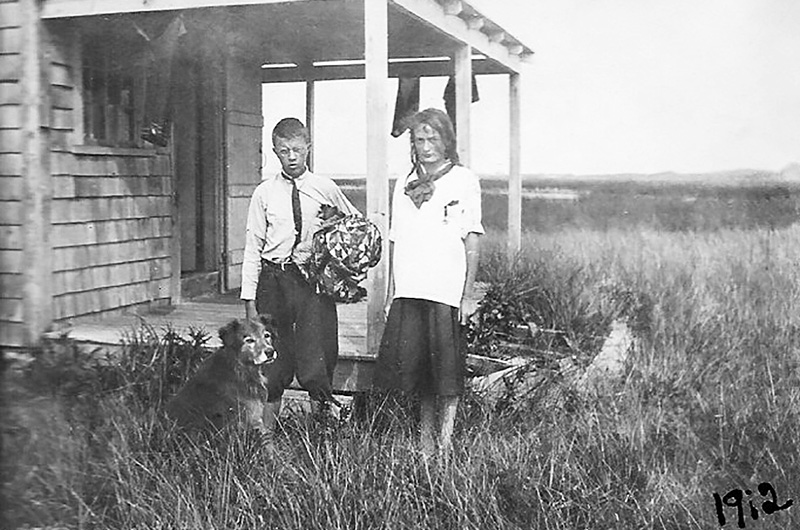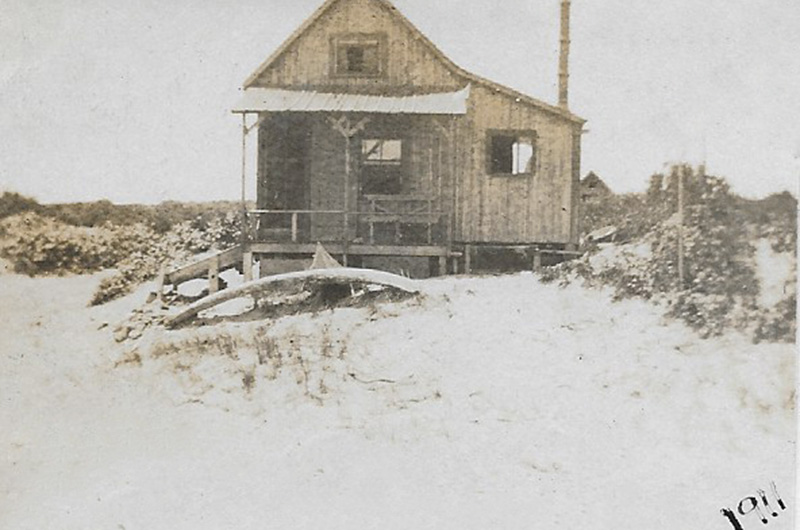Mosquitoes sang their evening lullaby. My mother tucked netting over my crib, and I, not wanting to be closed in, batted it away. My mother re-tucked it, safely out of my reach, she thought.
My crib was on the porch of our beach house, a former fisherman’s shack near Crab Creek, a skinny body of water connecting Black Point Pond with Tisbury Great Pond. Mosquito heaven, once the sun went down. My mother, sure that I was safely out of reach of the insistent mosquitoes, left, to be with my father and my two big sisters. Once she was safely out of sight, I remember batting away that netting, a covering that deprived me of my independence. And the mosquitoes closed in. I remember their song as distinctly as though it happened last evening. A high insistent whining. And their numbers, more than I knew how to count, closing in on me. And the itching.
I was two years old.
My Great Aunt Alvida had given my mother the fisherman’s shack on Quansoo, a section of wild barrier beach on the south shore, as a wedding present.
In my childhood, we spent every summer weekend at the beach house, our name for the shack. The sound of surf on the Atlantic Ocean side was a constant accompaniment, like the beating of my heart. Sometimes it was a fierce, rumbling thunder I could feel in my gut, sometimes a gentle purr. An opening cut in the bar allowed seawater to enter the pond and brackish pond water to flow out twice a day. The opening was a place where we could drift in, on the chilly ocean waters, or out on warm pond waters when the tide changed.
Mornings, the aroma of coffee brewing in a saucepan of boiling water with an eggshell to settle the grounds. Frying bacon. The scent of kerosene. The fragrance of Johnson’s Baby Powder dusted on me after the chafing of a wool bathing suit. All these are smells, even today, that vividly bring the Quansoo beach house back to life.
The shack had two rooms and the porch covered by a roof, where I slept in my crib. The front room was the kitchen, with a kerosene stove and a bucket of drinking water on one side, and my parents’ bed on the other side. The back room had a bunk bed for my two sisters.
To get water, we would cross Crab Creek on a narrow bridge to a pump standing alone on an iron pipe in what was then closely-cropped sheep pasture. Every evening, we’d hear the bleating of the sheep. My sisters would prime the pump by pouring water into the top of the pump, then work the handle up and down until sweet fresh water poured out.
My parents paddled to Quansoo by canoe, and I was their passenger. From Aunt Alla’s house, now known as the Cleaveland House, we’d cross Doane’s pasture and follow a woods trail to Tisbury Great Pond. I would ride on my father’s shoulders. I remember my father hiking me up as I slipped down his back, the feeling of my small hands on his forehead, slippery from sweat.
My parents kept the canoe, a derelict someone had given them that my father had restored, next to Dan’l Manter’s boathouse, paddles beneath it. Anyone could have taken the canoe and its paddles, but no one would.
My mother would buckle my puffy red life jacket onto me. Then they’d carry the canoe the few feet to the water, through a bit of pasture, cropped by sheep and strewn with their small pellet droppings, down a low bank lined with wild iris, across a narrow pebbly beach. My father made a seat for me, and once my mother was seated in the bow, he would lift me onto my seat, shove the canoe into deeper water, and get into the stern. We would paddle from Town Cove, the northernmost point of the pond, past Little Sandy, a small beach to our right, then past Big Sandy, a peninsula with a duck-shooting blind at the tip, and then we were in the main body of the pond.
My father and mother took advantage of the offshore breeze of the early morning, a following breeze that would augment their paddling toward Quansoo. On our return on Sunday, we would ride back to Dan’l Manter’s boathouse on the evening onshore breeze.
Over the weekend, we’d have made beach fires of driftwood and toasted hot dogs and marshmallows over the flames. We’d have caught, and eaten, crabs from Crab Creek, and dug for clams. I loved to find the breathing holes in the muck, and dig quickly to find the clam that had made that hole. I loved the sulfur smell of the clam flats, digging, and the feel of my bare feet soled by a sheet of adhesive muck, but I never liked eating clams. Their bellies were full of sand, their necks were ugly with gray wrinkles, two yellow rubber bands connected stomach and neck, and I never understood that the flavor was supposed to be divine. But I did love digging for them and didn’t mind occasionally slicing a finger on a sharp shell. The smell and sting of iodine is not an unpleasant memory.
On the return trip I would be sun-soaked, sated with the pleasures of sand and salt water, the cry of gulls, dips in the opening, the lusty smell of clam flats at low tide.
Sleepy, wrapped in a pale yellow cotton sweater of my mother’s, her smell snuggled up to my face, the dip of paddles, in perfect unison, the change in rhythm of the paddles, from the roughness of the main body of the pond to the stillness north of Big Sandy. A night heron, which my mother called a Quawk, would suddenly burst from the trees to our left. A splash of a fish. The sound of an early evening softball game in progress behind the Grange Hall, voices muted by distance, but sometimes recognizable, if the evening breeze was still enough.
Then came the ritual of putting the canoe away, my life jacket tucked under one of the seats, the short, prickly grass and sheep pellets under my bare feet. My mother would gather up whatever was to return to Aunt Alla’s house, my father would hoist me onto his shoulder, a sleepy, limp child. They, with me as cargo, walked along the pond’s edge to the trail, past gooseberry bushes, where my mother would sometimes stop long enough to pick berries for Aunt Alla to make gooseberry jam. Then into the woods, where my father would duck below branches that might sweep across my face, me holding his sweaty forehead, slumping behind his back.
On Sept. 21, 1938, one of the most powerful hurricanes ever recorded, hit New England, causing $620 million in damage — the equivalent of $41 billion in today’s dollars. The storm demolished the Quansoo beach house. The only evidence that it had ever existed was the china cabinet, which was swept up into Town Cove, with much of the china inside, including a teapot, intact.
Cynthia Riggs is a writer who lives in West Tisbury.






Comments (5)
Comments
Comment policy »